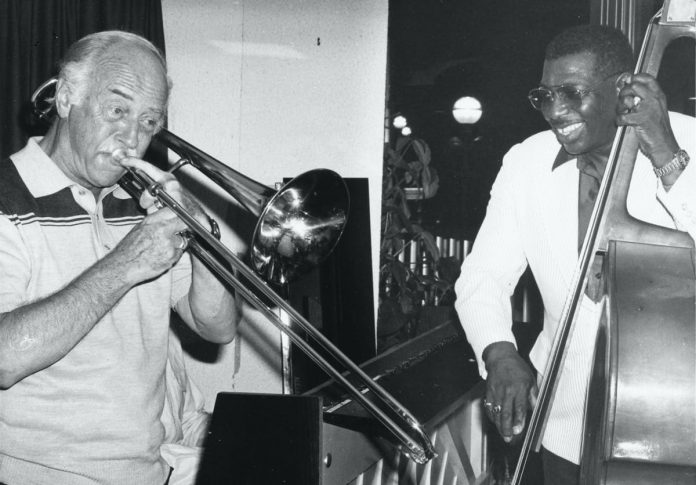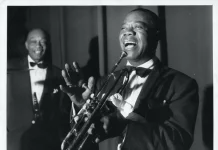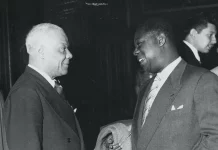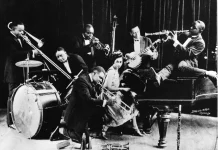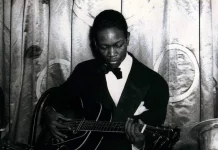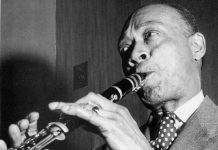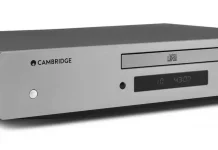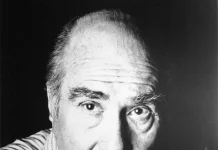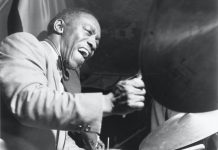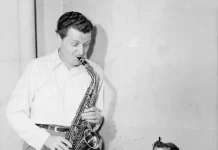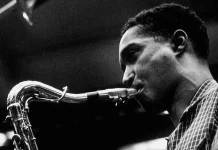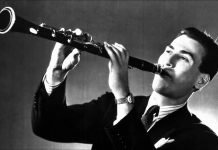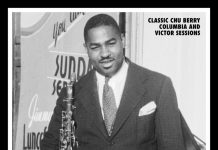Humphrey Lyttelton once toured with the Alex Welsh band and trombonist George Chisholm.
The tour went well, but Humph suffered from dreadful loss of sleep. George, a good friend of his, played After You’ve Gone as his feature number, with a note-for-note repeat each night.
Humph wrote to me complaining that he’d wake up each night in the small hours with George’s After You’ve Gone going round and round in his head, killing any hope of further rest.
I suppose most of us could feel like that about the Neal Hefti arrangement of April In Paris for Count Basie. We all know it note-for-note down to the last “One more time”, and it could easily rattle around the head in the small hours.
April In Paris recently reappeared on BBC 4 in the film Blazing Saddles, when Basie appeared to play it on a bandstand in a desert. Grotesquely the musicians, nearly all non-Basie, were miming to a version actually recorded by non-Basie studio musicians whom you would never have heard of. Why the complexity? The real Basie band wouldn’t have cost any more.
These days we expect the prices of things to get higher and higher as time goes on. Maybe it’s because of the fashion for downloading jazz albums from the Internet that the cost of physical CDs has often descended. The Avid company, of whom more later, has always been economical with charges for their usually excellent albums, but now, if you type your favourite names on line, you’ll often find surprising bargains. I recently discovered Johnny Hodges – The Best Of The Verve Years on Enlightenment EN4CD9163. This includes the Hodges-Ellington Back To Back and Side By Side albums along with Not So Dukish, awash with good stuff from the leader and his chosen sidekick Lawrence Brown, who played some of his best improvised solos on Johnny’s small-group records.
“I can’t play jazz,” Lawrence once told me. “I wish I could improvise like the other fellows.” What nonsense coming from one of the most exciting trombonists of them all.
The Hodges set includes eight albums in all. One of them has him backed by Joe Wilder, Hank Jones, Kenny Burrell and Milt Hinton. It’s probably the least good of Rabbit’s albums that I’ve heard. But that’s a minor thing since the other seven are all classics, notably including one with the Ellington band led by Strayhorn. It cost me just over six quid, whilst for Harry “Sweets” Edison – The Classic Albums, four CDs containing eight LPs on Enlightenment EN4CD915, I had to go up to ten quid. It was still a bargain, with Harry’s best including the indispensable Sweets (1956) with Ben Webster at his best, along with Barney Kessel and Jimmy Rowles (you might remember the Hollerin’ At The Watkins track) Rowles is the pianist on the Norgran Buddy And Sweets album, while Peterson appears on two more and Jimmy Jones, Sir Charles and Hank Jones make up the piano super league on the others.
The price went down again to around the six-quid mark for Lester Young The Classic Collection 1955-58 (Enlightenment EN4CD9123), for me the most outstanding with the most-prized Jazz Giants ’56, which has Teddy Wilson at his latterday best backing Prez, Vic D and Roy Eldridge in a mighty session. Lester’s best from the mid-50s is included here.
All the above have excellent sound quality.
It’s common knowledge that Avid’s CDs are very good in both content and sound with double albums ranging from £5.50 to £7.50.
Sound engineer Dave Bennett is responsible for a lot of the label’s output, and notable amongst his are the best version anywhere of Louis’s mid-30s Deccas on Thanks A Million (AMSC 574). Another spectacular set I’m particularly fond of is Louis Armstrong And The All Stars 1954-56 (AMSC 903) with the clarinet work split between Ed Hall and Barney Bigard.
Dave’s also responsible for the seven Johnny Hodges albums spread across AMSC999 (Castle Rock, In A Mellow Tone, Perdido and Creamy) and AMSC1040 (The Blues, More Of Johnny Hodges, In A Tender Mood and Johnny Hodges And Strings Play The Prettiest Gershwin).
The version of Mellotone on the album with that name has the most rampant and longest Lawrence Brown solo in a group that I know of. He swings his ass off, figuratively speaking.
When he has exceptional material Dave Bennett has been known to make a tiny issue from it, usually sold to friends or anyone who can find him for it. I’ve been lucky to hear a forthcoming one which I can highly recommend. It’s by the Yank Lawson-Wally Fawkes Big Four, which Dave recorded in May 1986. Guitarist Paul Sealey and Mick Hutton on bass round out this splendid band.
Anything Wally plays is to be treasured and he’s still deeply immersed in jazz (“I seem to be the oldest person I know,” he told me on his recent 95th birthday).
This 1986 set has him on great form and was late in the period when he played soprano as well as clarinet. You’ll get goose pimples when you hear Sidney Bechet coming at you through Beale Street Blues and the others. But it’s his clarinet work that is supreme. He doesn’t have the facility of Goodman or DeFranco, but the form and content of his solos is so profound by comparison that he’s a match for either.
Dave has recorded lots of sessions by Wally which he has been kind enough to lay on those of us who are close to him. They are all to be treasured, but the forthcoming one has the added magnificence of dear old Yank, who was adept at anything, whether it was being a studio musician for Bob Haggart or jousting with Billy Butterfield in the World’s Greatest Jazz Band. What a career he had! And the new CD will make an appropriate climax to the great man who died in February 1995.

